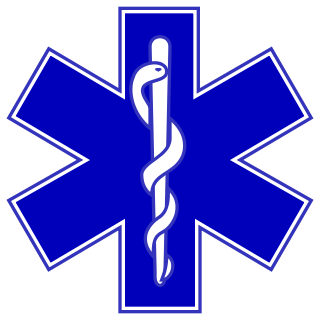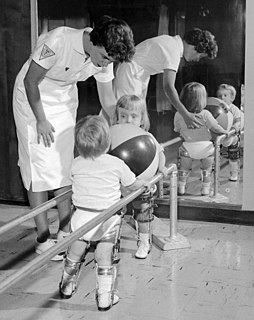
Physical therapy (PT), also known as physiotherapy, is one of the allied health professions that, by using mechanical force and movements, manual therapy, exercise therapy, and electrotherapy, remediates impairments and promotes mobility and function. Physical therapy is used to improve a patient's quality of life through examination, diagnosis, prognosis, physical intervention, and patient education. It is performed by physical therapists.
An occupational therapist (OT) works with a client to help them achieve a fulfilled and satisfied state in life through the use of "purposeful activity or interventions designed to achieve occupational outcomes which promote health, prevent injury or disability to develop, improve, sustain or restore the highest possible level of independence."

Vocational education is education that prepares people to work in various jobs, such as a trade, a craft, or as a technician. Vocational education is sometimes referred to as career education or technical education. A vocational school is a type of educational institution specifically designed to provide vocational education.

Emergency medical technician (EMT), paramedic and ambulance technician are terms used in some countries to denote a health care provider of emergency medical services. EMTs are clinicians, trained to respond quickly to emergency situations regarding medical issues, traumatic injuries and accident scenes.

Occupational therapy (OT) is the use of assessment and intervention to develop, recover, or maintain the meaningful activities, or occupations, of individuals, groups, or communities. It is an allied health profession performed by occupational therapists and Occupational Therapy Assistants. OTs often work with people with mental health problems, disabilities, injuries, or impairments.
Occupational noise is the amount of acoustic energy received by an employee's auditory system when they are working in the industry. Occupational noise, or industrial noise, is often a term used in occupational safety and health, as sustained exposure can cause permanent hearing damage.
Health psychology is the study of psychological and behavioral processes in health, illness, and healthcare. It is concerned with understanding how psychological, behavioral, and cultural factors contribute to physical health and illness. Psychological factors can affect health directly. For example, chronically occurring environmental stressors affecting the hypothalamic–pituitary–adrenal axis, cumulatively, can harm health. Behavioral factors can also affect a person's health. For example, certain behaviors can, over time, harm or enhance health. Health psychologists take a biopsychosocial approach. In other words, health psychologists understand health to be the product not only of biological processes but also of psychological, behavioral, and social processes.
A licensed practical nurse (LPN), in much of the United States and Canada, is a nurse who cares for people who are sick, injured, convalescent, or disabled. In the United States, LPNs work under the direction of physicians. In Canada, LPNs/RPNs work autonomously similar to the Registered Nurse in providing care and are responsible for their individual actions and practice. In California and Texas, such a nurse is referred to as a licensed vocational nurse (LVN).
Allied health professions are health care professions distinct from nursing, medicine, and pharmacy. They work in health care teams to make the health care system function by providing a range of diagnostic, technical, therapeutic and direct patient care and support services that are critical to the other health professionals they work with and the patients they serve.
National health insurance (NHI) – sometimes called statutory health insurance (SHI) – is a system of health insurance that insures a national population against the costs of health care. It may be administered by the public sector, the private sector, or a combination of both. Funding mechanisms vary with the particular program and country. National or Statutory health insurance does not equate to government-run or government-financed health care, but is usually established by national legislation. In some countries, such as Australia's Medicare system, the UK's National Health Service, and the South Korea’s National Health Insurance Corporation contributions to the system are made via general taxation and therefore are not optional even though use of the health system it finances is. In practice, most people paying for NHI will join it. Where the NHI involves a choice of multiple insurance funds, the rates of contributions may vary and the person has to choose which insurance fund to belong to.

Intercultural competence is a range of cognitive, affective, and behavioural skills that lead to effective and appropriate communication with people of other cultures. Effective intercultural communication relates to behaviors that culminate with the accomplishment of the desired goals of the interaction and all parties involved in the situation. Appropriate intercultural communication includes behaviors that suit the expectations of a specific culture, the characteristics of the situation, and the level of the relationship between the parties involved in the situation. It also takes into consideration one's own cultural norms and the best appropriate, comfortable compromise between the different cultural norms.
A health professional may operate within all branches of health care, including medicine, surgery, dentistry, midwifery, pharmacy, psychology, nursing or allied health professions. A health professional may also be a public/community health expert working for the common good of the society.

Socioeconomic status (SES) is an economic and sociological combined total measure of a person's work experience and of an individual's or family's economic and social position in relation to others, based on income, education, and occupation. When analyzing a family's SES, the household income, earners' education, and occupation are examined, as well as combined income, whereas for an individual's SES only their own attributes are assessed. However, SES is more commonly used to depict an economic difference in society as a whole.

Therapy is the attempted remediation of a health problem, usually following a diagnosis. In the medical field, it is usually synonymous with treatment. Among psychologists and other mental health professionals, including psychiatrists, psychiatric nurse practitioners, counselors, and clinical social workers, the term may refer specifically to psychotherapy. The English word therapy comes via Latin therapīa from Greek: θεραπεία and literally means "curing" or "healing".

Occupational stress is stress related to one's job. Occupational stress often stems from unexpected responsibilities and pressures that do not align with a person's knowledge, skills, or expectations, inhibiting one's ability to cope. Occupational stress can increase when workers do not feel supported by supervisors or colleagues, or feel as if they have little control over work processes.
Integrated care, also known as integrated health, coordinated care, comprehensive care, seamless care, or transmural care, is a worldwide trend in health care reforms and new organizational arrangements focusing on more coordinated and integrated forms of care provision. Integrated care may be seen as a response to the fragmented delivery of health and social services being an acknowledged problem in many health systems.
Unlicensed assistive personnel (UAP) is a class of paraprofessionals who assist individuals with physical disabilities, mental impairments, and other health care needs with their activities of daily living (ADLs). UAPs also provide bedside care—including basic nursing procedures—all under the supervision of a registered nurse, licensed practical nurse or other health care professional. UAPs must demonstrate their abilities and competencies before gaining any expanded responsibilities within the clinical setting. While providing this care, UAPs offer compassion and patience and are part of the patient's healthcare support system. Communication is key between UAPs and Registered Nurses (RN) as they are working together in the best interests of the patient.
Children with Special Healthcare Needs (CSHCN) are defined by the Maternal and Child Health Bureau as:









